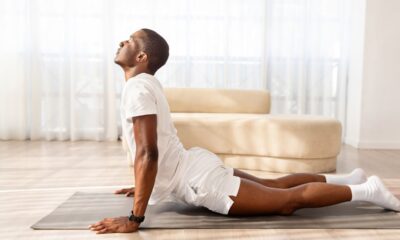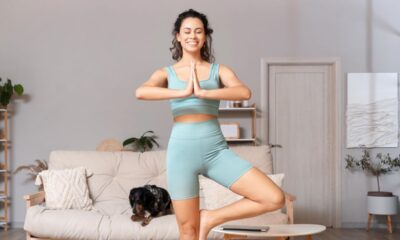Health
High-Intensity Yoga Shown to Improve Sleep Quality, Study Finds

Research from Harbin Sport University indicates that high-intensity yoga may significantly enhance sleep quality, potentially outperforming traditional sleep aids such as Ambien. The study, which analyzed 30 randomized controlled trials across more than a dozen countries, involved over 2,500 participants experiencing sleep disturbances. Findings suggest that engaging in yoga for approximately 30 minutes twice a week can lead to notable improvements in sleep quality.
The study highlights that high-intensity yoga, which often includes vigorous movements and breathwork, produced the most substantial results compared to other forms of exercise. Following yoga, walking was found to be the next most effective activity, with resistance training also showing positive effects. Traditional cardio exercises and blended routines did not yield the same level of improvement in sleep quality.
Understanding the Connection Between Yoga and Sleep
The reasons behind yoga’s effectiveness remain under investigation, but researchers speculate that specific breathwork techniques could play a crucial role. This form of breath control is believed to activate the parasympathetic nervous system, which helps the body transition from a state of high alert to one of calm relaxation. Some studies also indicate that yoga can influence brainwaves, encouraging deeper states of rest that are difficult to replicate through other forms of exercise, such as weightlifting or running on a treadmill.
Furthermore, the structured nature of yoga may provide additional benefits. Engaging in a physical activity that combines movement with mindfulness allows individuals to focus on their bodies and breath, which can be more productive than attempting to mentally coax oneself into relaxation.
Considerations and Recommendations
Despite the promising findings, the researchers caution against generalizing results, as yoga styles and intensities can vary widely. This variability means that the effectiveness of yoga may differ from one person to another. Additionally, sleep disturbances can manifest in numerous ways, leading to different experiences of what works for each individual. Accessibility remains another concern; not everyone has the opportunity to attend in-person classes or the space at home to practice yoga comfortably.
Nevertheless, the overarching message is clear: regular physical activity is beneficial. When that activity integrates breath control and muscle engagement, it may lead to better sleep outcomes. For those struggling with insomnia or exploring various supplements, incorporating high-intensity yoga could be a valuable alternative.
Individuals need not become avid practitioners; rather, finding a suitable yoga flow that challenges the body could yield significant benefits. For example, an intense vinyasa flow conducted in a warm environment may prove particularly effective.
In conclusion, the findings from this comprehensive study underscore the importance of movement and mindfulness in achieving better sleep. As more people seek solutions to sleep issues, exploring high-intensity yoga could be a promising path towards restful nights and improved overall well-being.
-

 Technology4 months ago
Technology4 months agoDiscover the Top 10 Calorie Counting Apps of 2025
-

 Health2 months ago
Health2 months agoBella Hadid Shares Health Update After Treatment for Lyme Disease
-

 Health3 months ago
Health3 months agoErin Bates Shares Recovery Update Following Sepsis Complications
-

 Technology3 weeks ago
Technology3 weeks agoDiscover 2025’s Top GPUs for Exceptional 4K Gaming Performance
-

 Technology2 months ago
Technology2 months agoElectric Moto Influencer Surronster Arrested in Tijuana
-

 Technology4 months ago
Technology4 months agoDiscover How to Reverse Image Search Using ChatGPT Effortlessly
-

 Technology4 months ago
Technology4 months agoMeta Initiates $60B AI Data Center Expansion, Starting in Ohio
-

 Technology4 months ago
Technology4 months agoRecovering a Suspended TikTok Account: A Step-by-Step Guide
-

 Health4 months ago
Health4 months agoTested: Rab Firewall Mountain Jacket Survives Harsh Conditions
-

 Lifestyle4 months ago
Lifestyle4 months agoBelton Family Reunites After Daughter Survives Hill Country Floods
-

 Technology3 months ago
Technology3 months agoUncovering the Top Five Most Challenging Motorcycles to Ride
-

 Technology4 weeks ago
Technology4 weeks agoDiscover the Best Wireless Earbuds for Every Lifestyle















